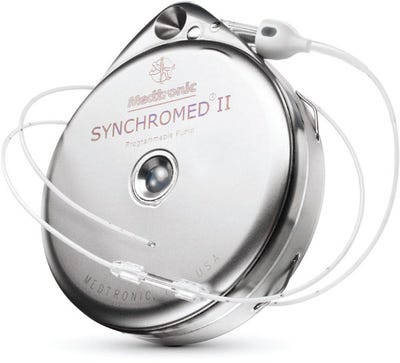More Patient Deaths Linked to Medtronic Infusion Pump
November 2, 2016
Medtronic's SynchroMed II Implantable Drug Infusion Pump has been tied to two more deaths, according to a letter from the company.
Qmed Staff

A Medtronic implantable infusion pump that has already been blamed for 14 deaths, cited in several Class I recalls, and which was hit last year with an FDA consent decree is now being tied to two additional deaths, according to a letter from the company.
The SynchroMed II Implantable Drug Infusion Pump can cause "delivery of more drug volume than the programmed rate, exceeding the pump's flow rate accuracy specification," Keith Taverner, Medtronic regulatory affairs manager UK & Ireland, wrote in a field safety notice provided to the UK's Medicines and Healthcare Products Regulatory agency last month. The problem can result in an overdose or underdose of medication to patients, and premature depletion of the drug caused by overinfusion will not trigger an alarm, the notice said.
The company has not determined the exact reason for the overinfusion problem, although it said risk factors include variability with pump components and manufacturing processes, the use of nonindicated drug formulations, and other factors associated with clinical use conditions.
Nearly a quarter of a million of the SynchroMed II pumps have been implanted in patients, and 103 of those have been linked to adverse events--resulting in temporary discomfort, life-threatening overdose and/or withdrawal, and two reports of death--as of July 5, 2016. Of the 103 pumps tied to adverse events, 99 were "associated with non-indicated drug formulations in use at the time of the pump's last refill," according to the company.
"Medtronic has been unable to establish a definitive causal relationship between the adverse events and overinfusion due to potential contributing factors," Taverner wrote in the letter. "However, it is reasonable to conclude that overinfusion was a contributing factor in these cases. Other factors that may have contributed to an adverse event are: infused drug dosage, the patient's medical history, and the concomitant use of other drugs, such as oral opioids and other central nervous system (CNS) depressants."
The company is not pulling the Synchromed II pumps from the field or advising preventive replacement of the pumps. It does, however, recommend users stick to indicated drug formulations. It's also urging healthcare providers to educate patients and other stakeholders about the symptoms that can result from overinfusion or underinfusion and take steps to avoid risk factors that may trigger the problem.
The SynchroMed II pump was slapped with an FDA consent decree last year that alleged Medtronic repeatedly failed to address manufacturing problems associated with the device and required the company to halt the device's manufacture and hire a third party to help it correct manufacturing violations. Between 2006 and 2013, the company's facilities in Columbian Heights, MN, were the subject of three warning letters for failing to follow good manufacturing practices for corrective and preventive action, design controls, and complaint handling.
Like what you're reading? Subscribe to our daily e-newsletter.
About the Author(s)
You May Also Like


